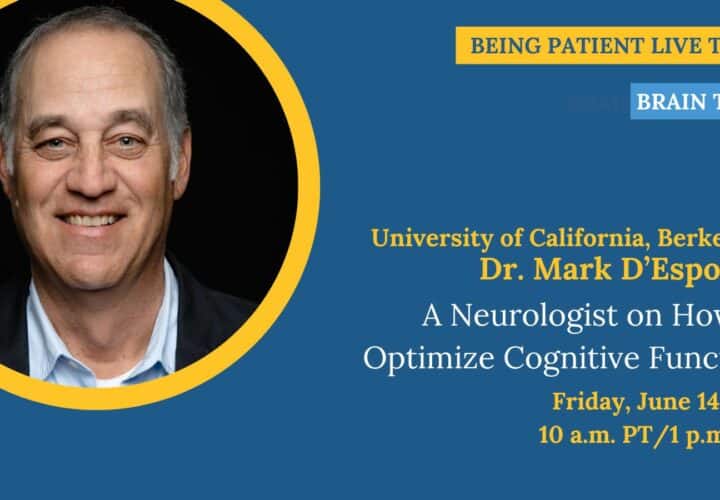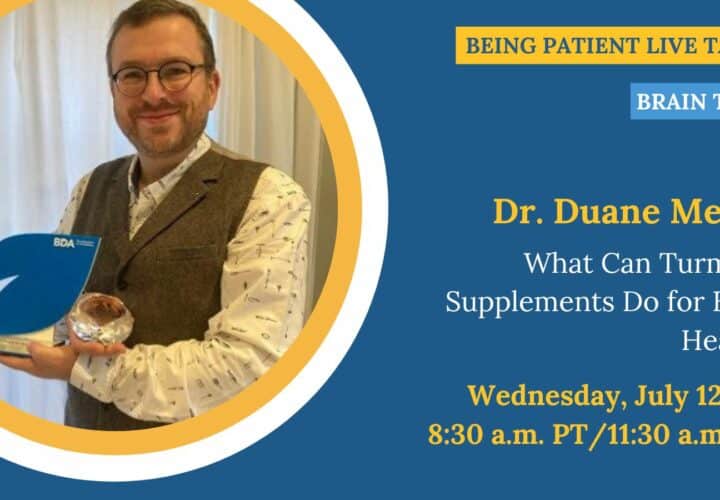Everyone’s memory skills are different, but understanding neuroplasticity can help you improve them. Dr. Mark D’Esposito, a neurologist at University of California Berkeley, shares insights on how to optimize brain function.
For people concerned about cognitive decline, improving and maintaining memory is incredibly important. But can you actually optimize your brain and slow the progression of neurodegenerative diseases like Alzheimer’s? Neurologists including Dr. Mark D’Esposito of University of California, Berkeley, are researching how the neural mechanisms behind cognition can help us improve memory and recover from injury. For D’Esposito, optimizing the brain can be achieved by understanding how the brain is structured – and can restructure itself through its plasticity.
“What we’ve learned is that when networks are more integrated … and able to really take information from all different walks of life and pull it together,” D’Esposito explained, “is when our brain is the healthiest.”
He joined Being Patient founder Deborah Kan in a conversation about how people concerned with Alzheimer’s risk can optimize their brain health and function. D’Esposito also discussed how neural mechanisms impact cognition to provide context on strategies for improving brain health.
Read or watch the conversation below.
Being Patient: How much can we do to improve memory?
Dr. Mark D’Esposito: The word we use in neurology is plasticity; brain plasticity. That just means how the brain changes – and the brain changes all the time. We’ve moved from an old way of thinking that we’re born with a set of neurons [and] we can’t grow new neurons [or that] we’re born with a brain that is wired in a certain way that we can’t change.
The real revolution over the last 20 years is that the brain has amazing plasticity, where it can change, and it could change at any age. What we’ve dialed in on is: how does that work? How can we change the brain? We … have much evidence that we can change the brain for the positive by an improved cognitive function through how the brain reorganizes.
Being Patient: I want to explain my experience with neural plasticity because I didn’t understand it until maybe a few years back. I started taking some piano lessons because I hadn’t played music since I was probably eight years old. I noticed when I started to learn piano again that all of my attention was on my left hand because I’m right-handed. Then, after about six months of playing every single day, that equalized, and I was able to look at a sheet of music and not think about my left hand. Then I thought, is that neuroplasticity because now I can do something I couldn’t do six months ago? What’s happening in my brain then, and why?
D’Esposito: That’s a great example of plasticity. It’s not that the brain grew new neurons [or] that you’ve suddenly [grown] a new brain area, and new neurons that are able to get your left hand working — it’s actually the neurons that we have reorganized.
The brain is organized in a network. It’s organized very much like other networks – the electrical grid, airline networks, social networks – and it’s built by modules. What we mean by modules is they’re networks that are very specific for certain things. One module [may be] for motor function, one module may be for language, and one for visual-spatial abilities. What happens in brain plasticity is not that those individual modules change; it’s the way they talk to each other.
You had modules that were capable of using both hands, but they never communicated with each other because you hadn’t learned that skill. As you’re learning that skill, it’s actually these modules integrating and talking to each other that, [in] the end, the brain reorganizes in a way that forms new connections. That’s exactly what brain plasticity is: reconfiguring brain networks that we already have.
“As you’re learning that skill, it’s actually these
modules integrating and talking to each other that,
[in] the end, the brain reorganizes in a way that
forms new connections between these modules.”
Being Patient: Why is that good for our brains? How does plasticity improve brain health?
D’Esposito: Brain health is a complicated term, but I’m glad it’s on everyone’s radar now. On one end of the spectrum of brain health, it’s like any other organ. It needs oxygen and blood flow. Right now, it also means good vascular health. We need to have vessels that are not clogged with atherosclerosis. We need to be healthy. We need to sleep.
[It needs] what every organ needs, but then, on the other hand, brain health is how our neurons are doing. Neurons are this unique thing that are so different from every other cell in every other organ. We’ve learned that when networks are more integrated, more communicating, and able to really take information from all different walks of life and pull it together, our brain is the healthiest. We’re not so stuck in very rigid sort of bottom-up automatic behaviors, but more flexible, goal-oriented sort of behaviors.
Being Patient: In your other interviews, you’ve discussed working memory versus long-term memory. Is working memory the same as short-term memory, or is it different?
D’Esposito: It’s different [from] a theoretical perspective, but essentially, it’s the same. When I talk about memory, the important thing to know is memory is not a unitary function. We think about memory as just one thing, but it’s actually many different things. The reason why we know that is because there are different parts of the brain that support different types of memory.
What I mean by long-term memory is information that we’ve learned: what we had for breakfast today, the last vacation, all the episodes that we store over time and then are able to retrieve — that’s what we call a long-term memory. That kind of memory is supported by a part of the brain called the hippocampus.
Then there’s an entirely different kind of memory, which we call working memory, which is the memory we use to hold information online in real-time when it’s not there. If I tell you my telephone number and you’ve got to type it into your phone, you have to hold those numbers online. When you’re listening to a conversation, you have to hold [that information.] The beginning of my sentence is gone, but you still remember what it is. Again, that’s the kind of online memory that’s there as long as you need it, and then it disappears. That’s what we call working memory.
In the clinical world, we call it short-term memory. There are some theoretical distinctions between the two. Working memory [is] a newer term because it has to do with more how we use [it]. Not only do we passively hold it, but we kind of manipulate it in our heads, as well. That’s kind of the working part.
“We think about memory as just one thing,
but it’s actually many different things.”
Being Patient: Does that not go on in the hippocampus? Does working memory take place in another part of the brain?
D’Esposito: The frontal lobe seemed to be most important for that. We’ve got two different memory systems that are supporting different kinds of memory. That’s why we can have patients with good long-term memory and bad working memory and vice versa. That’s actually an avenue into therapy where we can try and use another system to kind of take over or help compensate for the weakened system.
Being Patient: I’m fascinated by this because I’ve always thought I don’t have a good memory. I’m the type of person who can’t remember anyone’s face or name. I’ll see a movie; a year later, I will not remember what it’s about. The question that neurologists I’ve interviewed throw back at me is, “Well, have you always been that way?” I say yes, and they tell me that’s how my memory works. I question that because I wonder if there is a deficit within my brain that I can actually make better, so I’m fascinated by this compensation between two different systems. Can we help improve one type of memory if one of them has a deficit? Can the other one help improve it?
D’Esposito: We can definitely boost memory. We can boost our working memory capacity. If I sort of test you and see how many numbers you can remember, it might be six or seven numbers, and if we work, if we train you, we can get that capacity up for sure. The same thing with long-term memory; with training, you can boost your episodic memory.
I’d be hesitant to use the word deficit when we’re talking about healthy people because I think it’s just a bit of a bell curve and just reflects individual differences for every ability — reading, writing, whatever it is. I’m a very slow reader, so I’m on one end. I would say if we’re on one end, we don’t have a deficit, we’re just on one end of the spectrum, but we can sort of push you more or push you toward a more optimal functioning with training, for sure.
Being Patient: How can we improve our memory? Are there things we can do to boost our memory and overall brain health to avoid the tipping point of dementia?
D’Esposito: If we think about disease with patients that have a working memory deficit, then there are very focused cognitive training protocols that can focus in on working memory and try to boost that. If they have episodic long-term memory deficits, they can boost that. That’s targeted because it’s off the end of the bell curve, and we can try to boost it back to sort of normal because it’s leading to functional deficits.
[For those who have] working or [episodic] memory capacities on the lower end, it’s not necessarily leading to a deficit because that’s how we are, that’s how we’re built, and we’ve learned to sort of deal with it, right?
So, the question is whether we need to focus on these specific problems, like remembering names, or should we focus on brain health more generally? I’m of the opinion that we should generally boost our brain health. I wouldn’t spend a lot of time trying to improve my ability to remember people’s names if that’s just how I am. I don’t spend a lot of time trying to learn how to read faster.
The kinds of things that help improve brain health are, from a cognitive training standpoint: what are all those types of things that improve the highest level of abilities where we have to integrate information? Rather than [focusing on] boosting our vocabulary or boosting our ability [to do] puzzles, focus on things that actually aren’t problem-solving that involve integrating many different types of abilities like learning how to cook a meal, plan a family vacation, or plant a garden. Those will tap into all the different abilities and, I think, would have the biggest impact on improving brain health.
“Focus on things that actually aren’t problem-solving
that involve integrating many different types of
abilities like learning how to cook a meal,
plan a family vacation, or plant a garden.”
Being Patient: Can you find and treat deficiencies in the brain, such as dopamine, with supplements and medication?
D’Esposito: The chemistry of the brain is fascinating and it really hasn’t been given as much attention as I think it should. We did learn a very long time ago that Alzheimer’s disease, for example, is the deficiency of acetylcholine, which is one of the neurochemicals in the brain. That’s why the first approved drug for Alzheimer’s disease was a drug – and still is a drug – that boosts the amount of acetylcholine in the brain because long-term memory depends on acetylcholine.
By boosting acetylcholine, we can improve our long-term memory. Then on the flip side, another neurochemical, dopamine, seems to be the chemical that’s most important for working memory. We know that if you have a deficiency of dopamine, such as in Parkinson’s disease, that you’ll have problems with working memory. If we boost dopamine, patients will be better in their working memory.
For example, in Parkinson’s patients, before they’ve taken their meds and after they take their medications, when we give them more dopamine they’re better. So, that’s definitely true for patients that have known deficiencies. The issue is, what about healthy individuals?
Again, it’s a bell curve, and there’s individual differences. There are many people who are deficient in acetylcholine or dopamine and don’t know it. That’s the problem. We don’t have a blood test that can tell us if we’re deficient in these neurochemicals. There’s an enzyme in the brain that breaks down dopamine, and if you’re deficient in this enzyme, you can actually have less dopamine, just baseline, and not really know it. If we were to give you dopamine, you would improve your working memory.
I think the goal is to try and develop blood tests that actually can measure dopamine so we can intelligently know if you should be supplementing or not. I wouldn’t recommend just supplementing dopamine because the way neurochemicals work, [more is not] better; there’s actually an optimal amount. If you take too much, you actually can get worse. I think our goal in medicine is to try and establish sort of what our own personal neurochemistry is, and then try to target the supplements to those who need it.
“I think the goal is to try and develop blood tests
that actually can measure dopamine so we can
intelligently know if you should
be supplementing or not.”
Being Patient: How hard would it be to understand how much acetylcholine or dopamine is in your brain? If there is a blood test, will that measure the amount that’s actually in the brain?
D’Esposito: That’s the problem. There’s a test called positron emission tomography, which can actually take dopamine and acetylcholine and label it in a way that we can measure in the brain. It’s invasive and involves injecting a radioisotope. It’s expensive, but we’ve done studies where we’ve measured dopamine in the brains of healthy undergraduates at Berkeley. It perfectly correlates with how [good] their working memory is. The more dopamine in the brain that we know for sure we can measure does translate to working memory and increases working memory capacity.
I could see somewhere there becoming a test like PET that’s not invasive and can measure these neurochemicals, but they’re not there yet. Like you said, the blood is a problem, because we don’t know. The blood is not a really good marker of how much is in the brain. Not only does it [not] tell us how much is in the brain, but we don’t know where it is in the brain if we measure it from blood.
That’s why, right now, we don’t have tests. For the enzyme, we can measure whether your enzyme is deficient, but that’s not part of standard clinical practice right now.
Being Patient: Our audience has a question about how trauma affects memory. What do we know about that?
D’Esposito: I’m not sure if she’s talking about physical or emotional trauma, but I can answer both. On the emotional trauma side, emotion is a very important factor in how we remember information. We all remember information better when there’s some emotion tagged. If it’s on one extreme, and something tragic happens, like 911, the memories are much more vivid later on. If it’s something [where] we got embarrassed, we’ll always kind of remember that moment as well. It’s significantly tied to the emotion – the more emotion involved in the episode, the better we will remember it.
On the physical side, when the brain has trauma, it tends to affect the part of the brain that gets most affected, the frontal lobes, just because of the way the brain is. The skull under the brain is irregular and gets banged against the skull. So, patients with physical trauma to the brain tend to have more working memory deficits, so they tend to have more of a decrease in dopamine and acetylcholine.
Being Patient: How much could changing energy sources impact or improve memory, such as switching from glucose to ketones?
D’Esposito: Anything that increases energy is going to be good for brain health. If we just started talking about energy, we can go back to how we think about networks. The brain is full of networks, and it requires energy. It’s organized with these hubs where some parts of the brain are more important than other parts of the brain. If you think about an airline network, there are airports everywhere, but there are only a few that are really important networks, like Chicago and Dallas.
If you’re trying to get from New York to San Francisco, even though you’re not going through Chicago, if something’s happening in Chicago, you might get delayed because it’s this incredibly important, busy hub. In Milwaukee, for example, something might be going down there, and you might not even notice it.
That’s how the brain is organized. Certain regions are hubs. We call them the most biologically costly. They’re taking the most energy. By boosting the energy, we’re actually improving these hubs, and we’re kind of improving this hub function. That’s why improving energy doesn’t just help the brain overall, it’s actually targeted to the most important parts of the brain.
Then on the oxygen side, oxygen also helps us and any way we can get more oxygen; obviously, exercise is the best way to sort of improve oxygen to the brain, and that will also improve the function of these critical brain areas.
“Anything that increases energy is going to be good for brain health.”
Being Patient: I was interviewing Dr. Claudia Kawas, who’s done the 90+ study, which is a fascinating study. You have to be 90 years old to go in, and it’s been going on for 18 years. They’ve had people in it who have beta-amyloid plaque in their brain and never got Alzheimer’s. I asked her what the one commonality was, and she said it was socialization. She actually said eight hours of socialization a day. What do we actually know about socialization and the brain? Do we know why it’s good for our brains?
D’Esposito: That’s a fascinating topic that’s getting increasing traction. Recently, one of my good friends’ mom turned 90, and she had 150 people show up to her birthday party. I was thinking, if I have 150 people, that will be an amazing achievement, but I think that’s why she’s incredibly healthy. [She] plays golf and does all these things because she has 150 friends that she’s connected to.
There’s a project that I’m involved with called the BrainHealth project. It’s run out of UT Dallas. The director of the project is Dr. Sandy Chapman and the goal is to enroll 100,000 people into this study in order to try and develop an index of brain health and try and develop ways to improve brain health.
It’s mirrored off of the Framingham Heart Study, which followed individuals for many, many years, and still is, and was revolutionary in terms of determining cardiac health. It’s why we know you need to lower your cholesterol and lower your blood pressure. We want to know, what do we need to do to improve brain health? Also, how do we measure brain health?
To me, what’s so frustrating is that when you go to your family doctor, every organ in the body is examined except for your brain. It’s not the fault of family physicians; it’s just that we haven’t given them the tools to measure brain health.
Part of it is developing a brain health index. Their brain health index is very broad. It measures a lot of cognitive things. It measures many real life things like exercise and nutrition. It measures wellbeing, things like stress and quality of life, but it also has a bunch of measurements about social measurements, how socially engaged you are, how kind you are, how much support you have.
They’ve already enrolled over 30,000 individuals. When they’re starting to look at the data, there are three kinds of factors that seem to most predict brain health. One obviously is cognitive, the higher level of cognitive abilities. A second is sort of one’s mood state. The third was actually social connectedness. It was as critical a factor to brain health as these other factors.
Now it’s on our radar, how important social connection is. I think it gets back to sort of how you boost networks, how you improve networks. It’s just that’s what you do when you’re social, right? That’s what you do.
When you’re socially connected you boost the ability of networks to talk to each other, and you have a more integrated kind of brain. I think there’s a real biological basis to socialization, they make it maybe one of the easiest things to do because it’s free, right?
“When you’re socially connected you boost the
ability of networks to talk to each other, and
you have a more integrated kind of brain.”
Being Patient: Are there any supplements you take that we should know about? How do we know that it’s actually benefiting our brains? Or do we not?
D’Esposito: I don’t. I’ve really concentrated on a healthy diet. I feel you should get everything that the brain needs through your diet. I think that’s the best way to improve brain health, but I do think there’s going to be a role [for] supplements.
We do know that there are individuals like I said, that have less dopamine, and they might have less acetylcholine, or they may have less B12, or whatever it is. If we can measure that, then that’s where there’s a role [for] supplements. There are supplements that can boost acetylcholine and dopamine. Again, unless we know you’re deficient, I wouldn’t recommend taking them because you’re doing it blindly.
Like I said, you can actually take too much. I think … there needs to be a much bigger push towards measuring our own personal neurochemistry. Then I think there will be a big role for nutritional supplements when we can do it in a logical way.
Being Patient: Do you have an opinion of the new monoclonal antibody therapies to treat Alzheimer’s? Do you have an opinion about those drugs and their efficacy?
D’Esposito: I think my opinion is pretty similar to all of the panels and real experts in Alzheimer’s disease. It is what it is. All we know is from what our observations are. I think what’s been very frustrating is that none of the medications right for Alzheimer’s have been the big blockbusters that we were looking for, but I agree with all the studies that there is some effect; it’s just not the kind of big effect that we’ve been hoping for.
Katy Koop is writer and theater artist in Raleigh, NC.




Thanks for the interest and action to connect! Electronic connections are sometimes among the only communications available with family and close friends as we age ….
Hi Joanne, thank you for being here! Social connection is so important for overall brain function. Here’s a great article on Alzheimer’s and social interaction you might find interesting: https://www.beingpatient.com/alzheimers-and-social-interaction-heres-what-you-need-to-know/